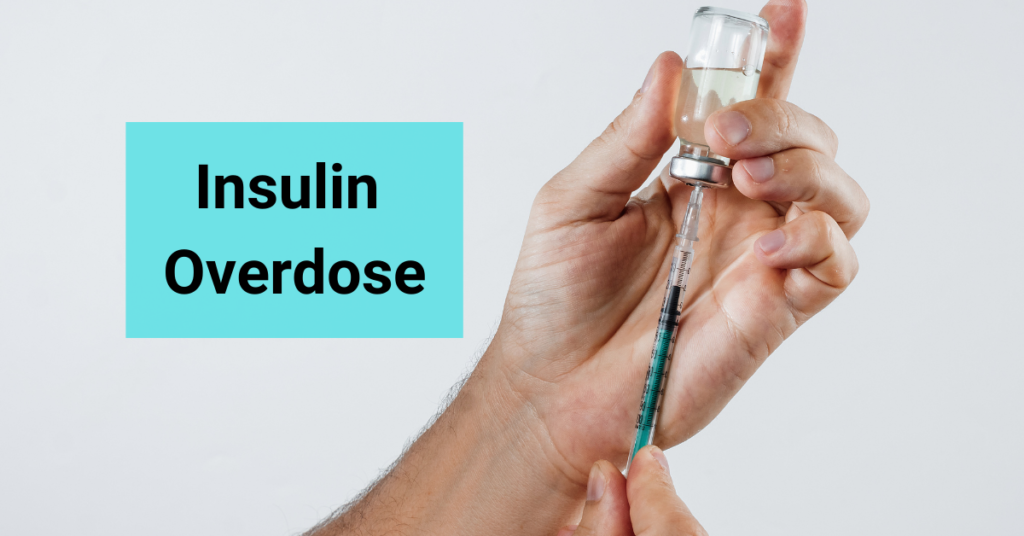Contents
Insulin Overdose
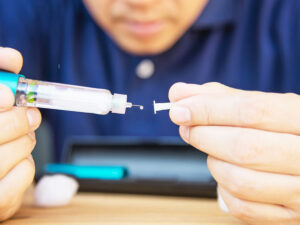 Insulin is an important hormone that is used to treat diabetes in a large number of people. An insulin overdose can be dangerous for diabetics. Moreover, it helps in the normal absorption of sugar by the body’s cells. Inappropriate dosage of insulin can cause severe health hazards. Overdosing of insulin can be fatal. If you have non-insulin-dependent diabetes mellitus (type 2 diabetes), your body doesn’t utilize insulin properly and your pancreas does not adjust by producing enough insulin. As a result, it requires insulin therapy that helps to keep your blood sugar level from becoming too high. Maintaining a healthy blood sugar level is important for your overall health. It can also help you avoid consequences like blindness, kidney disease, amputations, and a heart attack or stroke. If your doctor advises you that you need insulin to regulate your blood sugar levels adequately, you should begin therapy as soon as possible. If you don’t take insulin when you need it, then you develop risks for serious health problems like high blood sugar, often known as hyperglycemia.
Insulin is an important hormone that is used to treat diabetes in a large number of people. An insulin overdose can be dangerous for diabetics. Moreover, it helps in the normal absorption of sugar by the body’s cells. Inappropriate dosage of insulin can cause severe health hazards. Overdosing of insulin can be fatal. If you have non-insulin-dependent diabetes mellitus (type 2 diabetes), your body doesn’t utilize insulin properly and your pancreas does not adjust by producing enough insulin. As a result, it requires insulin therapy that helps to keep your blood sugar level from becoming too high. Maintaining a healthy blood sugar level is important for your overall health. It can also help you avoid consequences like blindness, kidney disease, amputations, and a heart attack or stroke. If your doctor advises you that you need insulin to regulate your blood sugar levels adequately, you should begin therapy as soon as possible. If you don’t take insulin when you need it, then you develop risks for serious health problems like high blood sugar, often known as hyperglycemia.
Symptoms of Insulin Overdose
Insulin overdose in the bloodstream leads your body’s cells to take too much glucose (sugar) from the bloodstream. It also reduces the amount of glucose released by the liver. Together, these two consequences result in dangerously low blood glucose levels. Hypoglycemia is the medical term for this illness. For your body to function effectively, you need the right amount of glucose in your blood. Glucose is the primary source of energy for your body. Your body will run out of energy if you don’t have it. The severity of the condition is determined by the low blood sugar level. It also depends on the individual, as each person reacts differently to different conditions.
Mild Hypoglycemia
Some symptoms of mild hypoglycemia or low blood sugar include: 
- Shakiness
- Irritability
- Hunger
- Blurred vision
- Rapid heartbeat
- Anxiety
- Chills
- Sweating and clamminess
- Mild confusion
- Tingling in the lips
However, they do require quick intervention to avoid low blood sugar levels. Patients with low blood sugar should consume 15 grams of a quick-digesting carbohydrate, such as glucose tablets or a high-sugar meal. Glucose-rich food items include:
- Soda
- Raisins
- Honey
- Candy
- Fruit juice
Within 15 minutes of eating, your symptoms should improve. If they don’t, or if a test reveals that your blood sugar levels are still low, then you need to control your blood sugar level. It should be above 70 mg/dL. If your symptoms do not improve after three sessions, visit a doctor. Also, after addressing a low blood sugar reaction, consume a high protein or high glucose meal.
Severe Hypoglycemia
Hypoglycemia with more severe symptoms, sometimes known as diabetic shock or insulin shock, includes: 
- Unconsciousness
- Concentration problems
- Death
- Seizures
Glucagon should be available to all the people on insulin. It works by reversing the effects of insulin. In most cases, it will need to be injected by family members or professional doctors. You may need to go to the emergency department if something goes wrong with the dosage of glucagon that you are using to treat hypoglycemia. You can consult with your doctor if a person goes unconscious as a result of an insulin overdose.
Types Of Insulin Doses
Diabetes affects everyone differently, and insulin doses fluctuate greatly from one person to the next. For one person, a dose that is appropriate may be an overdose for another. Insulin can be given by injection or by the pump. However, there are various methods for managing and estimating insulin overdose. Most people will require two sorts of doses:
- A basal dose, also known as a long-acting dose, maintains blood sugar levels throughout the day.
- A bolus dose provides an extra boost to a person’s needs.
Basal Insulin
Basal insulin is the type of insulin that requires maintaining a constant blood sugar level throughout the day. The amount of insulin required by a person is determined by the body’s reaction to insulin at a particular time of the day. When we fast, our bodies gradually release glucose into the bloodstream which further supplies energy to our cells. Basal insulin should be check regularly to maintain blood glucose levels. This allows cells to absorb glucose for energy. Depending on the insulin, it is normally taken once or twice a day. Moreover, your doctor will assist you in determining an appropriate basal insulin dose and, if required, adjusting it over time.
Mealtime Insulin
After a meal, people take mealtime or bolus insulin. Glucose, or sugar, enters the bloodstream as the body breaks down food. It raises blood sugar levels. A diabetic will require additional insulin to deal with this sugar so that the body can effectively utilize it. The body cannot digest sugar without insulin. This results in an excess of sugar in the blood and an insufficient amount of insulin in the body’s cells. People should consider the following factors to determine mealtime insulin levels. These factors include:
- Checking blood sugar level before the meal
- Amount of carbohydrates in the food you eat
- How actively do they intend to be following their lunch?
- Level of insulin sensitivity
- Blood sugar level target
This process can be complicated. It is so because there is much room for errors in mealtime insulin.
Other Variables
Because several forms of insulin are available, users must follow these other factors when calculating their doses. Another factor to consider is insulin’s potency. This is referred to as U-100. Depending on the individual’s needs, higher concentrations of insulin up to U-500 are also available in the market. Each of these criteria has a part in determining the best insulin dose for a diabetic. It can be called an overdose if the numbers are incorrect and the person consumes too much insulin.
Intentional Insulin Overdose
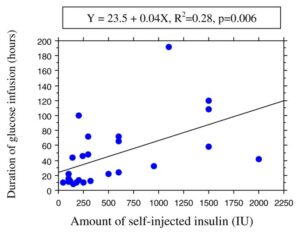 According to studies, diabetes patients are more likely to suffer from depression and suicide. A person who is depressed or suffering from a mental disorder may purposefully take an insulin overdose. If you or a loved one is suffering from depression, see a doctor right away. Also, be sure you’re familiar with the signs and symptoms of an insulin overdose in an emergency. However, it has the potential to save someone’s life.
According to studies, diabetes patients are more likely to suffer from depression and suicide. A person who is depressed or suffering from a mental disorder may purposefully take an insulin overdose. If you or a loved one is suffering from depression, see a doctor right away. Also, be sure you’re familiar with the signs and symptoms of an insulin overdose in an emergency. However, it has the potential to save someone’s life.
Accidental Insulin Overdose
Trying to balance your insulin demands with the factors of food, activity, stress, weight management, and so on is a constant problem in life with diabetics. Even the early symptoms of an overdose can be caused by taking one or two units of insulin more than your body requires. Some of the causes of accidental insulin overdose are: 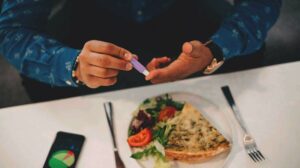
- Taking an insulin dose twice a day for before and after meals.
- When you regularly take your long-acting insulin once a day but now taking it twice in one day.
- Taking insulin in preparation for a planned meal but forgetting to consume your food.
- Overestimating the amount of insulin that it requires for a meal is a common mistake.
- Overestimating the amount of insulin required to get blood sugar level back to normal.
- Exercising with too much insulin in your bloodstream.
- Using your rapid-acting insulin instead of your long-acting insulin.
- You’ve been given an insulin dose that doesn’t correspond to your body’s needs.
- Changes in your insulin sensitivity, such as weight loss, improved nutrition, less stress, increased exercise, and so on.
- Taking insulin for a high-carb/high-fat meal that doesn’t digest quickly enough to match your insulin peak.
Treatment Of Insulin Overdose
The amount of extra insulin dosed determines how you treat an insulin overdose. If the low blood sugar was only a few units and you’re mentally alert and capable of feeding yourself, it should be easily rectified with a modest snack. The higher the insulin overdose, the more probable you’ll need more serious medical help.
For Mild Insulin Overdoses
For this, your blood sugar level should be between 50 to 70 mg/dL. Some people may lose consciousness at 50 mg/dL. While this is a rare occurrence, it is crucial to understand your personal tolerance for hypoglycemia. If you’ve ever lost consciousness with a blood sugar level at or slightly below 50 mg/dL, then you should use a glucagon kit to address it more seriously. Moreover, you can also treat your low blood sugar level with fast-acting carbohydrates foods like: 
- Honey
- Juice
- Dried fruit
- Jelly beans
- Gummy candies
- Syrup
For Moderate To Severe Insulin Overdoses
Combining insulin doses with the many other variables that affect blood sugar levels is a difficult game. Diabetics are in danger of an insulin overdose practically every day of the week if they use insulin. The more you pay attention to how much insulin you need with specific meals and meals that occur right before activity, the less likely you are to overdose on it. However, there are two things that you should do while suffering from severe hypoglycemic or insulin overdoses. These are: 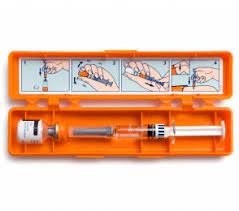
- Using a Glucogen kit will help you in saving your life. A glucagon kit works by injecting you with glucagon, a hormone that stimulates your liver to release glucose that has been stored in your body (sugar). Doctors always prescribe glucogen kits to overcome the insulin overdoses effects on the body.
- Another one is immediately consulting with your doctor. It will administer intravenous dextrose (a fast-acting carbohydrate) in the hopes of reviving the person who has had a severe insulin overdose.
Dosage For Insulin Overdose
Diabetics must take insulin in the correct dosage, just like any other drug. The appropriate dosage will assist you while causing no damage. Basal insulin is the type of insulin that keeps your blood sugar level constant throughout the day. The right dosage is determined by several factors, including the time of the day. It is also determined that if you are insulin resistant or not. The correct dosage of lunchtime insulin is determined by factors such as:
- Your blood sugar level before or after a meal
- Meal’s carbohydrate content
- Sensitivity to insulin
- Your post-meal blood sugar targets
Insulin medicines are also available in a variety of forms. Some are quick-acting that you can use within 15 minutes. Short-acting (regular) insulin takes 30 to 60 minutes to start working. These are the insulins that you take before a meal. Other forms of insulin are used for basal insulin because they last longer. They take longer to affect blood sugar levels, but they last for 24 hours.
Prevention For Insulin Overdose
There are several things you may do to avoid an insulin overdose. The majority of them revolve around preventing mistakes when taking insulin and remembering when and how much you took. Below are some of the preventions for overdosing on insulin:
- Maintain your schedule that you or your doctor have fixed for taking insulin. It will help you to stay on track.
- Whenever you are taking insulin than at that time never skip your meals. Eat any fruit or bread or drink milk even if you are not feeling hungry.
- You should always be prepared for insulin complications. These complications can happen at any time. So keep candies with yourself in that emergency time period.
- If dealing with hypoglycemic then make sure your family or friends take appropriate action at that time. It is so because low blood sugar levels can make you confused.
- You can also wear a medical alert bracelet. Also, make sure that it says you use insulin.
Hence, if you’re having trouble seeing the numbers or gradations on your insulin pen or syringe, seek assistance. Else, you can also consult your doctor about some tips and precautions.
A Word From Mantra Care
The above article explains the risks of having insulin overdose. However, you need to take insulin as prescribed by your doctor. Otherwise, it can affect your life in many ways. You can also conclude that how insulin is important for diabetics. Also, it is important to manage it properly.
Do you want to get rid of diabetes? Join our online diabetes consultation program and reverse your Diabetes naturally through lifestyle changes such as a Personalized Diet plan, Exercise, dieticians, and health coaches.
